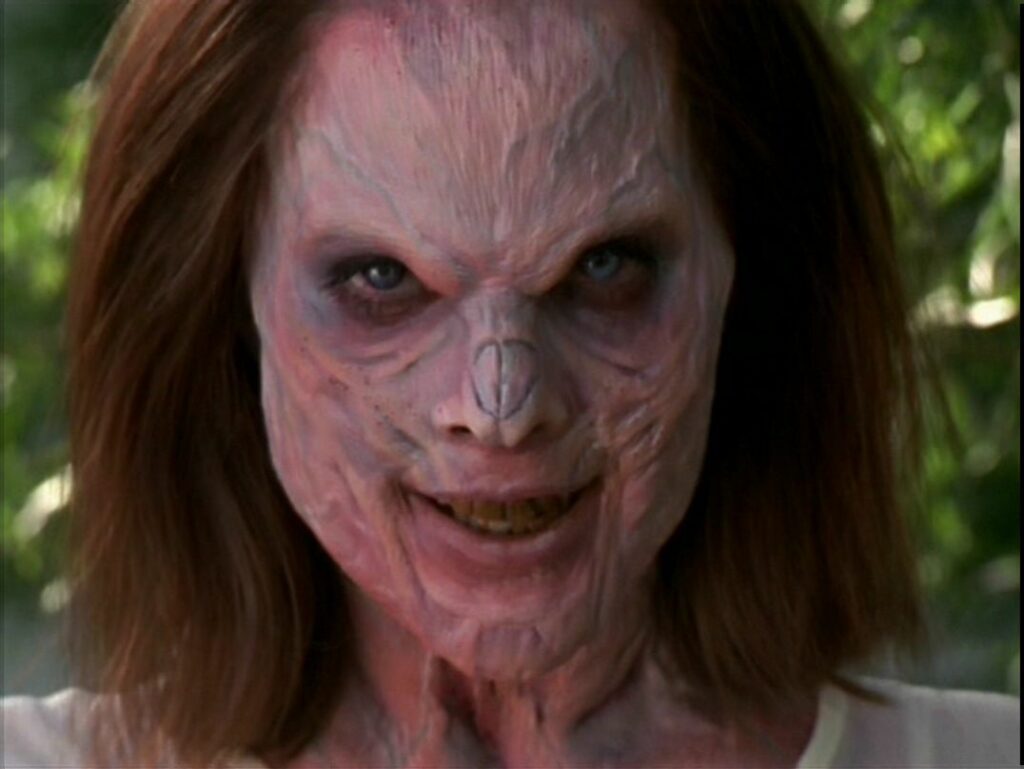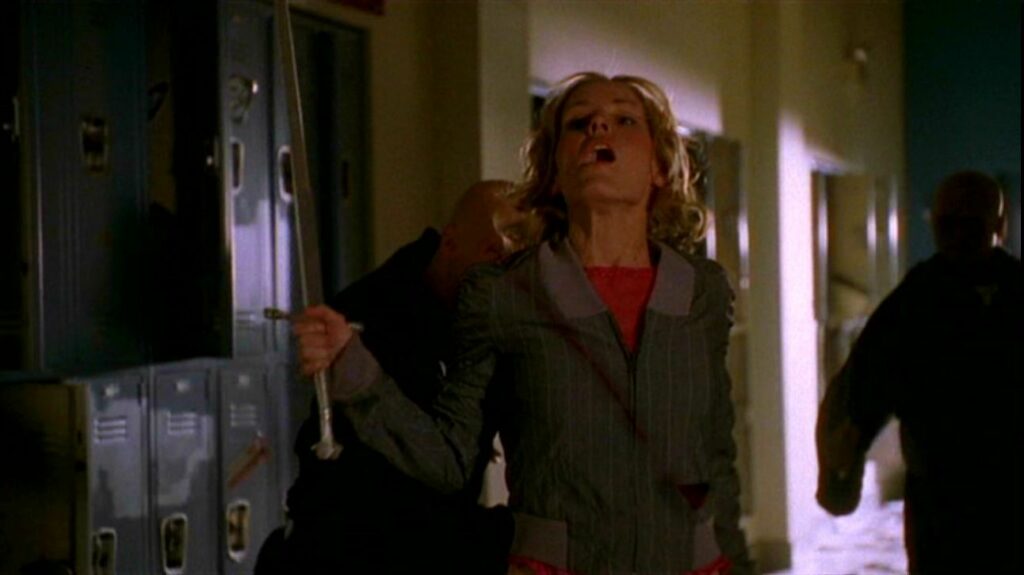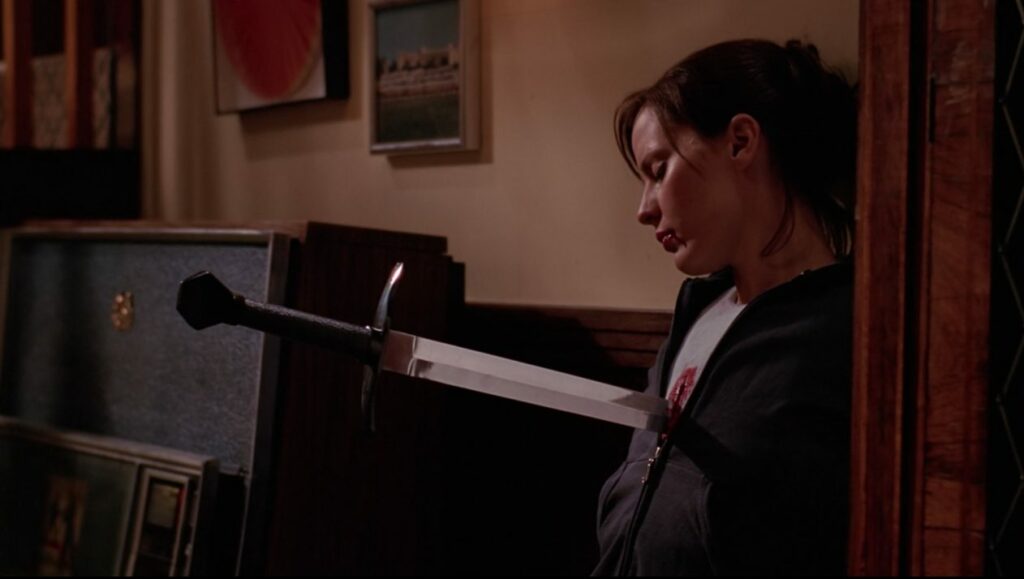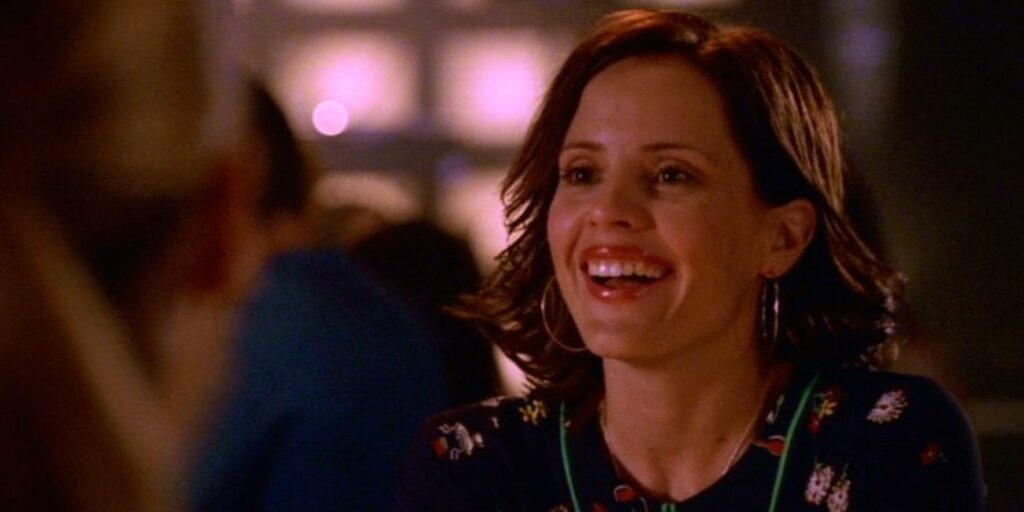Angel and Spike aren’t the only demons who reclaim their humanity in Buffy the Vampire Slayer. Anya, everyone’s favorite vengeance-demon-turned-cashier, endures the same journey with much less fanfare. She doesn’t get her own spinoff or fulfill some grand prophecy, but her arc runs parallel to the show’s most beloved stories. Across 1,000-something years, Anya goes from human to demon and back again twice, traversing the mortal divide enough to earn frequent transmutation miles—yet she never features as large in the narrative as the show’s favorite vampires. Her comparatively minor presence, however, endows her humanity with profound authenticity.
Villainous Beginnings

Anya isn’t thrust into the spotlight like Angel or Spike. To first-time viewers, she’s just another monster of the week: a demon who sends Sunnydale into a bleak alternate timeline by granting a scorned woman’s wish. Upon defeat at the hands of Giles, she reverts to human form—in the body of a teenager, no less—unable to grant wishes and mortified to be mortal. The episode ends there, doling out an ostensible end to another one-off villain.
Her ensuing path to the main cast is delightfully circuitous. She disappears for six episodes, returns to deal with the fallout from her last appearance, disappears again, emerges to ask Xander to prom, then disappears again as she skips town to avoid the apocalypse. Her sporadic presence across Season 3 feels like a joke: the monster of the week who stuck around school. By the time Season 4 rolls around, the show seems ready to stop delivering the punchline—but three episodes in, she returns unannounced, declares herself Xander’s girlfriend, and remains a fixture of the cast until the series finale.
An Unexpected Friend
Anya doesn’t join the gang so much as she gloms on to them. Her need for human connection, reawakened after 1,000 years dormant, drives her headfirst into the only people her age with similar interests. This social effort comes to define her. Without an Angel- or Spike-sized role in the narrative, she has room to focus on personal goals: find an apartment, hold down a job, get married, have kids, live comfortably and happily. Her aid in the Scoobies’ efforts is incidental to her relationship with one of them. Her most frequent clashes are with unspoken social norms—she’s blunt to the point of tactlessness, unashamedly self-interested, and a little too comfortable with violence. When everyone is concerned with the fate of the world, her fumbling approach to the day-to-day is the show’s most straightforwardly human conflict.
Her acerbic humor and smaller-scale arcs translate nicely to existential comedy. Anya is a constant, lovable reminder that being human is, ultimately, pretty weird. It’s fitting, then, that she faces the weirdest part of life in the series finale: death.
Gone Too Soon
Anya’s death is one of the series’ most shocking. It comes out of nowhere and happens so fast. As the battle between Buffy and the First Evil rages across nu-Sunnydale High, we see Buffy, Faith, and Spike fighting underground; cut to Xander and Dawn defending one chokepoint, then to Andrew and Anya defending another—suddenly Anya is sliced in half from behind. Before your brain can process that information, the scene has already cut to Giles and Wood fighting elsewhere. We see one glimpse of her corpse before the show ends for good.

This starkly contrasts Spike’s death in the same episode. Spike gets a big, operatic finish, saving the world and delivering some killer lines before he goes. Anya just goes—and she goes for good. Buffy’s other recovering demons are duly resurrected, with Angel escaping hell in Buffy Season 3 and Spike reappearing in Angel. Anya is silenced and never heard from again. In the grand scheme of things, she’s not consequential enough to escape the finality of mortality.
The Beginning of the End
But her abrupt end is perfectly in line with her burgeoning humanity. From the moment she’s human again, her awareness of death’s inevitability creeps up on her like a disease. After a vampire breaks her arm in Season 5, she starts rushing through her goals like there’s no time to lose, telling Xander that she needs an apartment now because she “may have as few as 50 years left.” When Xander presses, he realizes that Anya’s injury stirred something in her.
XANDER: You haven’t been hurt like this since you became human. Maybe it’s finally hitting you what being human means.
ANYA: No, that’s not it…
XANDER: Yes, I think it is. You were gonna live for thousands of years, and now you’re gonna age and die. That must be terrifying.
As Buffy blurs the moral lines between human and demon, the mortal gap only widens. The great divide between the supernatural and the human is finitude. To Anya, every goal now comes with an unknown deadline. It’s a startling new reality for a woman who, for centuries before, had wantonly slaughtered her way into anything she wanted. Death doesn’t just stop one’s heart; it leaves plans unfinished and possibilities truncated. The very humanity that made her comfortable with an ordinary life now threatens its continuance.
Looming Mortality
The unfairness of that contradiction sticks with her. When Buffy’s mom dies of a brain aneurysm, Anya seems incapable of mourning respectfully, horrifying Willow with questions like “Are we gonna see the body?” and “Are they gonna cut the body open?” Willow begs her to shut her mouth, and Anya breaks down into a tearful monologue.
But I don’t understand! I don’t understand how this all happens, how we go through this. I mean, I knew her, and then she’s—there’s just a body. And I don’t understand why she just can’t get back in it and not be dead anymore. It’s stupid; it’s mortal and stupid! And Xander’s crying and not talking, and I was having fruit punch, and I thought, ‘well, Joyce will never have any more fruit punch ever, and she’ll never have eggs or yawn or brush her hair, not ever,’ and no one will explain to me why.
It’s heartrending, not least because Emma Caulfield, who demonstrates her comedic chops time and time again as Anya, proves that she’s just as adept a dramatic actor. Her flustered, internalized grief speaks to a subtextual connection between her and Joyce: they were both just women trying to go about their lives. To be human—to really be human—is to find meaning in the little things while we have them. When Angel and Spike regain their souls, they set about balancing the grand scales of good and evil; when Anya regains her humanity, she fixes her sights on the minutiae: her appearance, her job, the foods she likes, the man she could marry. What shakes Anya about death is how immediately and entirely the little things cease. How mortal and stupid indeed.
Inhuman Resurrection

This fear of loss plays a role in her eventual return to demonhood. After she loses Xander at the altar—an abandonment she simply can’t handle—she retreats to the stable, permanent work of wreaking demonic vengeance. Restored to the level of biologically immortal threat, she even gets to enjoy a staple of the Prominent Character experience: a fakeout death. In Season 7’s “Selfless”, Buffy stabs Anya through the chest for massacring a fraternity, leaving her pinned motionless to the wall—but she comes to, pulls the sword out, and expresses regret for her actions, having grown more familiar with the tragedy of death. Her remorse costs her the vengeance demon gig, and she’s human once again.
That Anya undergoes this “death” while inhuman is fitting. Using one’s own demise as an opportunity for growth is as far from the human experience as one can get. When Spike and Angel resurrect to carry out their callings, they arguably become more myth than human—we can still relate to them, but not so much existentially. Anya can only enjoy resurrection when she’s lapsed from humanity, and even then, her ensuing return to mortal form is a step toward real death. Despite her best efforts, she can’t escape entropy closing in. That’s the very human nature we created myths to console ourselves over.
A Real Girl

In the series finale, Anya’s descent into reality concludes. She’s just a little person in a big war. Her comparatively small significance to the show allows it to nullify her, to desiccate all the little things she might have given meaning, to shake us with the loss of a bright, lively presence. That’s human death. She becomes to us what Joyce was to her.
The terrifying authenticity of her death leaves us, as people often do, scrambling to find meaning in her final moments. She dies saving one of the show’s least capable characters—Tucker’s brother Andrew—so her sacrifice is unlikely to change the world. But her conversation with Andrew in the previous episode speaks volumes. Asked why she’s risking her life to fight the apocalypse instead of skipping town again, Anya responds:
I guess I was kinda new to being around humans before. But now I’ve seen a lot more, gotten to know people, seen what they’re capable of, and—I guess I just realized how amazingly screwed up they all are […] they have no purpose that unites them, so they just drift around, blundering through life until they die, which they know is coming, yet every single one of them is surprised when it happens to them […] And yet, here’s the thing: when it’s something that really matters, they fight.
After blundering through her new lease at life, Anya goes out at the height of her humanity: dying for no reason while fighting for a reason. Her death is the most suitable apogee to her journey through the human experience. Well, that and the “wheelchair fight” she has with Andrew before the final battle—what’s more human than messing around in the face of annihilation?


Nice Homage.
Nice Homage.
Anya is probably my favorite member of “the scoobies” because I absolutely loved her journey in discovering humanity. As much as I cursed out my television when watching the finale when her death came (there were lots of tears) I’ve come to understand that it really was a natural progression of her character.
Anya is probably my favorite member of “the scoobies” because I absolutely loved her journey in discovering humanity. As much as I cursed out my television when watching the finale when her death came (there were lots of tears) I’ve come to understand that it really was a natural progression of her character.
Congratulations posting one of the more thoughtful and touching pieces the site has published lately.
I am going to respectfully disagree with one point you made, however. Anya did NOT die with no reason. She died protecting another human. And what a human! Andrew is an immature nebbish with a questionable-at-best moral compass. In other words, Andrew is a deeply flawed man — exactly the type of terribly human human whom vengeance-demon Anya used to dispatch with hardly a thought.
In dying to save a human, and precisely the same type of human she used to self-righteously murder, Anya redeemed herself from centuries of wrongdoing.
I would say it is a parallel to the death of Darla in spin-of show Angel: the Series. Dalra, an evil vampire who killed remorselessly for centuries, including babies (during the Boxer Rebellion in China, she broke up with Angelus/Angel because he would not join her in that action), finally died by sacrificing herself so that her own baby might live.
Congratulations posting one of the more thoughtful and touching pieces the site has published lately.
I am going to respectfully disagree with one point you made, however. Anya did NOT die with no reason. She died protecting another human. And what a human! Andrew is an immature nebbish with a questionable-at-best moral compass. In other words, Andrew is a deeply flawed man — exactly the type of terribly human human whom vengeance-demon Anya used to dispatch with hardly a thought.
In dying to save a human, and precisely the same type of human she used to self-righteously murder, Anya redeemed herself from centuries of wrongdoing.
I would say it is a parallel to the death of Darla in spin-of show Angel: the Series. Dalra, an evil vampire who killed remorselessly for centuries, including babies (during the Boxer Rebellion in China, she broke up with Angelus/Angel because he would not join her in that action), finally died by sacrificing herself so that her own baby might live.
While I don’t disagree with most of your points about Anya’s humanity, I don’t feel that Anya ever became a nice person. She definitely wasn’t nice to Buffy, making a point of frequently pointing out that they weren’t friends and leading the pack about tossing her out of her own house. I think she only liked Andrew because she understood him, jerk to jerk.
While I don’t disagree with most of your points about Anya’s humanity, I don’t feel that Anya ever became a nice person. She definitely wasn’t nice to Buffy, making a point of frequently pointing out that they weren’t friends and leading the pack about tossing her out of her own house. I think she only liked Andrew because she understood him, jerk to jerk.